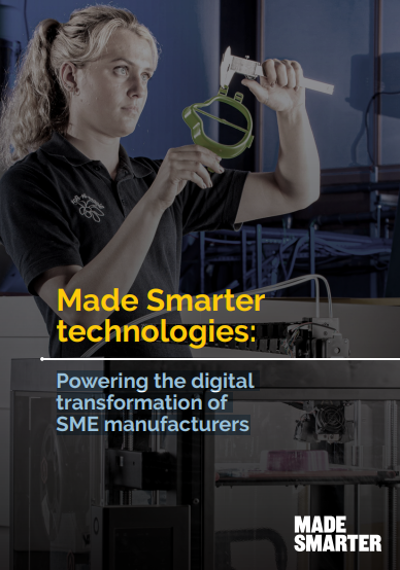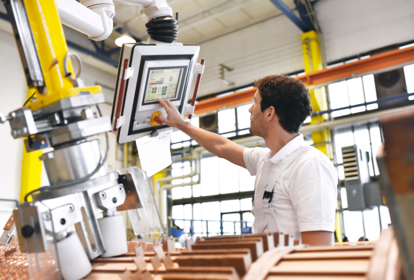
Made Smarter Technologies: Powering the Digital Transformation of SME Manufacturers.
There’s no doubt that technology adoption and digital transformation has surged in recent years.
Global challenges have shown what can be achieved with greater connectivity and automation, and the need for ever-increasing digitalisation.
Demonstrating these technologies in action, showing not just telling, is vital to Made Smarter’s success.
Download the whitepaper to find out more about the technologies helping manufacturers succeed.
Download the white paperExecutive summary
The origins of Made Smarter started with a question: what is holding back UK manufacturing from achieving greater productivity, performance and potential?
At the heart of the complex answer was our failure to take advantage of the digital tools and technologies that emerged from the shift from analogue to digital, the so-called Third Industrial Revolution.
We learned early on that most businesses needed stronger foundations to start their journey toward the aspirational smart factory of the future.
As Made Smarter architect Jurgen Maier said in the influential Made Smarter Review we have left those opportunities to other nations.
And as a result, we have fallen behind in our readiness to fully embrace the next great technological leap, the Fourth Industrial Revolution.
This next revolution is marked by the emergence of nine technologies from artificial intelligence (AI) and the Industrial Internet of Things (IIoT) to robotics and additive manufacturing.
Adopting these digital and physical technologies into the value chain at the right time and in the right way is the key to unlocking a myriad of benefits.
As pioneers of the adoption programme model, we have developed expertise in the potential application of those industrial digitalisation technologies (IDTs) and communicated their transformative potential to SME manufacturers.
We learned early on that most businesses needed stronger foundations to start their journey towards the aspirational smart factory of the future. This has meant most (50%) grant funded projects have focussed on data and systems integration technology, as well as sensors to enable factory connectivity.
Business leaders have achieved real-time visualisation of their processes, been able to spot trends in production and labour, correct maintenance and quality issues, and minimise safety, business risk and operational downtime throughout their production.
Meanwhile, automation - both process control and robotics - has been a keen focus of investment (25%) as manufacturers have replaced manual methods of making things. Those adopting these technologies are realising a raft of benefits including an increase in productivity, improved precision, consistency and quality, as well as opportunities to reduce operational costs by allowing machines to take on the burden of repetitive, low-value and sometimes dangerous work.
There have been some early adopters,who have already captured data and linked systems, and are now focusing on analytics and artificial intelligence to get more insight and value from their manufacturing operations.
But the good news is that, with infrastructure now in place for so many Made Smarter supported manufacturers, they are also now ready for more sophisticated, boundary-pushing technologies such as analytics, machine learning and AI, which are evolving at unprecedented speed.
Over the last five years Made Smarter has helped 300 manufacturers invest £22.5m in a range of IDTs and reap a raft of rewards including 1,600 new jobs, 2,850 upskilled roles, all while boosting the economy by £242m.
While we have engaged more than 2,500 makers, that is far from the majority, so we are redoubling our efforts to reach thousands of other manufacturers in the region and to inspire and inform them about the benefits of technology adoption.
Demonstrating rather than telling people how technology is done properly is key to our future success. We have built a growing network of thousands of manufacturers who are learning from each other
Simultaneously, we have also developed partnerships with industry leading institutions such as NERIC, PrintCity and AMRC NW to better understand the industrial application of technologies.
After all, digital isn’t coming – it’s arrived. And for us to fully unlock and realise the benefits for industry, society and the planet, we must address the challenges together.
Donna Edwards,
Director of Made Smarter’s North West
Adoption Programme


